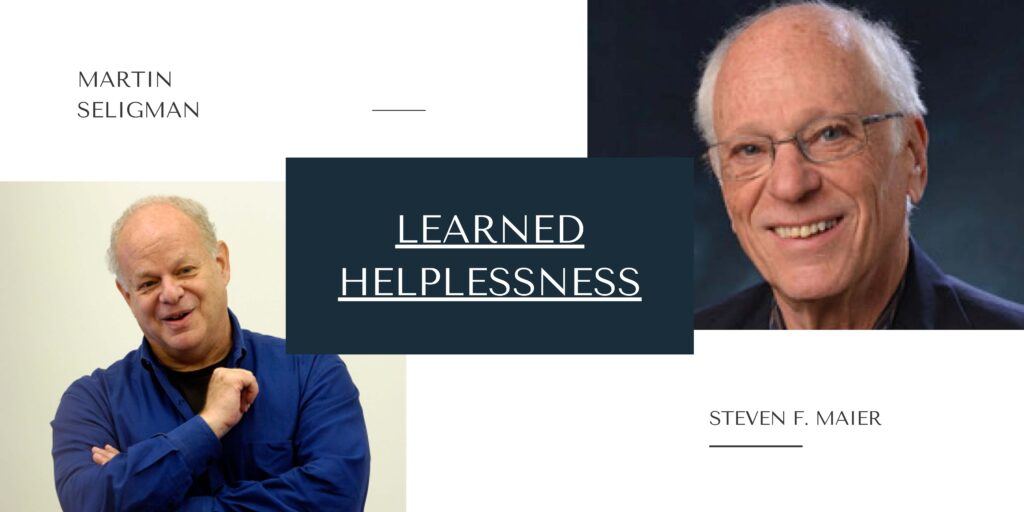Martin Seligman and Steven F. Maier, psychologists, accidently developed the notion of learned helplessness. They had first noticed such behaviour in dogs that had been trained to expect an electrical shock when they heard a tone.
The dogs were eventually placed in a shuttlebox with two chambers separated by a modest barrier. One half of the floor was electrified, whereas the other was not. Even though escaping the shock required only hopping over a short barrier, the dogs previously treated to classical conditioning made no attempt to flee.
Humans’ Learned Helplessness
The effects of learned helplessness have been found in a variety of animal species, but they may also be seen in humans.
Consider the following scenario: A youngster who consistently does poorly on arithmetic examinations and assignments may rapidly come to believe that nothing he does can improve his math skills. He may feel powerless in the future when confronted with any form of math-related assignment.
Learned helplessness has also been linked to a variety of psychiatric problems. Learned helplessness can aggravate depression, anxiety, phobias, shyness, and loneliness.
A woman who is timid in social circumstances, for example, may come to believe that there is nothing she can do to alleviate her symptoms.
Children’s Learned Helplessness
Unreliable or insensitive caretakers can contribute to sentiments of learned helplessness, which commonly begins in infancy. This sense of powerlessness can develop at any age. Children who are raised in institutions, for example, often show signs of helplessness as early as infancy.
When children want assistance but no one responds, they may believe that nothing they do will improve their condition. Repeated experiences that reinforce emotions of helplessness and hopelessness might lead to an adult sense that there is nothing that can be done to remedy one’s issues.
The following are some of the most typical signs of learned helplessness in children:
- Refusal to seek assistance
- Frustration
- Giving up
- Low self-esteem due to a lack of effort
- Passivity
- Insufficient motivation
- Procrastination
Mental Health and Learned Helplessness
Learned helplessness can lead to anxiety and can affect the development, severity, and persistence of illnesses like generalised anxiety disorder (GAD).
When you have chronic anxiety, you may give up trying to find relief since your anxious sensations seem inescapable and uncontrollable. As a result, persons suffering from mental illnesses such as anxiety or depression may refuse to take drugs or treatment that may help them feel better.
Learned helplessness may become a vicious cycle as individuals become older. When dealing with issues such as anxiety or depression, people may believe that there is nothing that can be done to alleviate their symptoms.
Getting Rid of Learned Helplessness
So, how might people overcome their sense of helplessness? According to research, learned helplessness may be successfully reduced, especially if intervention happens early on. Long-term learned helplessness can be decreased as well, albeit it may take more work over time.
Therapy can enable those who have learnt helplessness to feel less helpless. Cognitive-behavioral therapy (CBT) is a type of psychotherapy that can help people overcome the thought and behaviour patterns that lead to learned helplessness.
The purpose of cognitive behavioural therapy (CBT) is to help patients discover negative thinking patterns that lead to emotions of learned helplessness and then replace them with more positive and reasonable views. This method usually entails carefully studying your thoughts, actively questioning them, and refuting unfavourable thought patterns.
A word from Dr. Rameez Shaikh
Learned helplessness can have serious consequences for one’s mental health and well-being. People who have acquired helplessness are more prone to have depressive symptoms, high stress levels, and a lack of willingness to take care of their physical health.
Not everyone reacts to situations in the same way. Because of biological and psychological variables, certain people are more inclined to develop learned helplessness in the face of uncontrolled situations. Children reared by helpless parents, for example, are more prone to develop a sense of helplessness later in life.
If you believe that learned helplessness is affecting your life and health, talk to your doctor about what measures you may take to address this sort of thinking.

Dr. Rameez Shaikh (MBBS, MD, MIPS) is a consultant Psychiatrist, Sexologist & Psychotherapist in Nagpur and works at Mind & Mood Clinic. He believes that science-based treatment, encompassing spiritual, physical, and mental health, will provide you with the long-lasting knowledge and tool to find happiness and wholeness again.
Dr. Rameez Shaikh, a dedicated psychiatrist , is a beacon of compassion and understanding in the realm of mental health. With a genuine passion for helping others, he combines his extensive knowledge and empathetic approach to create a supportive space for his patients.

